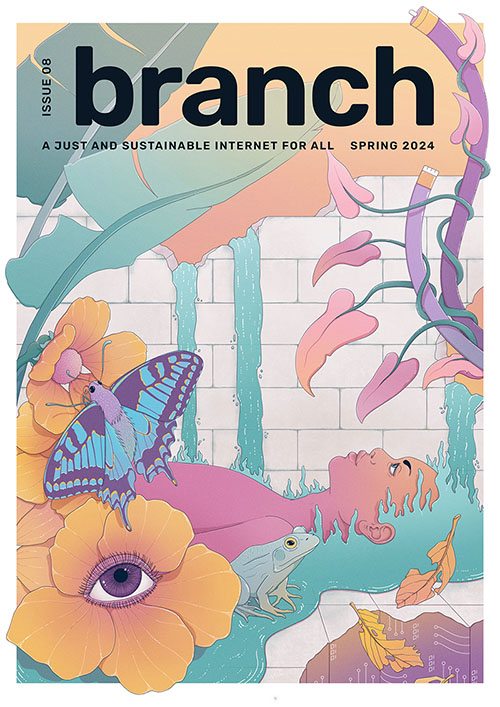In collaboration with Green Web Foundation and their long time partner on the Sustainable Web Design Methodology, Wholegrain Digital, we are proud to present Branch Issue 8. This issue was launched at the end of April 2024 and celebrates the theme of “Finding beauty in the imperfect”.
Issue 8 is more than just a collection of articles; it’s a testament to our shared belief that perfection is the enemy of progress. Guest-edited in a one-off collaboration between Hannah Smith, COO at Green Web Foundation, and Marketa Benisek, Digital Sustainability Lead at Wholegrain Digital, this issue challenges the notion that only perfection is worth pursuing. Instead, it celebrates the beauty found in imperfection and the lessons it teaches us as we, a global community of tech workers, use our skills to take and accelerate climate action.

In a world grappling with climate change and social challenges, Issue 8 explores how we can build a more just, sustainable, and humane web. Through 23 thought-provoking articles, we delve into the power of imperfect action, drawing inspiration from nature and the wisdom of embracing imperfection.
Join us as we explore the possibilities of a more sustainable and compassionate digital world.
Issue 8 overview
The 23 individual articles of this issue in light of the theme of “finding beauty in the imperfect” can be viewed not only as a mindset, but also as a loose journey guiding us on how to build a just, sustainable and more humane web. You can read the Editors’ letter for more details.
To make this issue even more personal, Hannah and Marketa have recorded a short video introducing themselves, the theme, and the individual articles. We invite you to watch it as a first step towards feeling inspired on your journey towards a better future and a better web.
You can also find a visual overview of the content and articles in an issue 8 slidedeck.
Issue 8 contents
We start off with quick reflections of ten members of the ClimateAction.tech community who reflected on our prompt: “what is imperfectly beautiful in climate tech to you?”. This is a great way to ease yourself into the topics and viewpoints that come up and are discussed in more detail throughout.
You might also consider taking a look at our Branch issue 8 playlist to get you in the mood. 40 songs have been suggested by the readers of Branch that help them to keep being motivated to be catalysts for change. Afterall, music is a great way to create a sense of connection and motivation for the body and mind to take action.
The rest of the articles have been grouped into four categories.
1. Meaningful connection
The four pieces in this category set out to explore how we can create meaningful connections in the context of using digital technologies or solving sustainability challenges.
- Talking it out: Restoring information ecosystems through authentic human connections by Bárbara Paes and Olivia Johnson, explores if we should we prioritise human-driven processes over tech fixes to build stronger information ecosystems based on trust and meaningful connections.
- One Movement, Four Wings: Connecting climate strategies by Melissa Hsiung, shares a tool for adopting a more constructive approach to climate action: the butterfly metaphor for transformative social change.
- Connectivity, infrastructure and the defence of the Amazon’s socio-biodiverse ecosystems by Hemanuel Veras explores how the lack of network infrastructure in the Amazon limits digital access for indigenous and traditional communities while supporting environmentally harmful enterprises.
- What can digital sustainability learn from accessibility? by Mike Masey, considers how we can apply lessons and patterns from the accessibility movement to the emerging digital sustainability movement.
2. Solarpunk and other speculative features
The six pieces in this section explore imaginings of a better, more meaningfully connected tech future, and what a more just and sustainable internet could be, despite real-world constraint.
- Octavia’s Future is Here, Now What by Mica Le John, examines the parallels and divergences between Butler’s fictional world and our current reality, offering a call to imagine the future you want.
- Care for life, care for the chips: the future is re-used, recycled and permacomputing by Alistair Alexander, explores the imperfect answers arising from asking what we can do to radically cut down on our spiralling CPU habit.
- Toward a Pragmatic Future: Accepting Imperfect Systems whilst Striving for Regeneration by Oliver Cronk, shares ideas on how the internet can support a future of regeneration and symbiosis over extraction.
- Solarpunk Meets Better Business: Reimagining a Sustainable Digital Future by Simon Blackler shares a solarpunk inspired vision for how we, and his company Krystal, can create a world where business, technology, and nature are in harmony
- Pause by Jo Lindsay Walton’s essay explores the imperfect questions that can still spark important conversations, including when to ask for pause.
- Ministry of Imagination Manifesto by Rob Hopkins describes a manifesto that’s based on a positive vision of the future and is appropriately ambitious to the scale of the challenges the world is facing.
3. Design philosophy
These five pieces in this step delve into various design values that embrace imperfection within the realm of fostering meaningful digital connections.
- Designing Friction where Marketa Benisek interviewed Luna Maurer, Roel Wouters, creators of the ‘Designing Friction’ project where they challenge the digital culture’s obsession with seamless experiences and advocate for intentional friction in design to create deeper human connections.
- The Wabi Sabi Web by Tom Greenwood, asks if the flawless digital world could take inspiration from the Wabi Sabi philosophy to incorporate imperfection and impermanence into digital designs?
- Echoes of electronic waste by Joanna Murzyn investigates the real impact of e-waste, through this immersive documentation of a community in India, surrounded by the e-waste we design into our world.
- Imperfect design for a better future by Thorsten Jonas, explores the concept of perfection, arguing that seeking it creates injustice and imbalance, and advocating for a paradigm shift towards imperfection and balance in design processes.
- Alternative networks: Consciously designing from within earthly dynamics by Jesse Thompson explores how recognising our connection to nature can guide us in designing a more sustainable and fair internet.
4. Perfection is the enemy of progress
This set of five pieces sets out to explore the downsides of perfectionism in the context of software development and data analysis, particularly when applied to solving sustainability-related problems, and how such drawbacks can be overcome.
- The perfect site doesn’t exist by Michelle Barker explains what building a humane web means to her and how notions of perfectionism can stand in the way of developers building it.
- Rabbit holes of perfection by Mary Pitt examines how Western medicine and Tech are both chasing the holy grail of perfect data, why this risks trashing the planet, and what can be done about it.
- From bytes to carbon savings: Immediate’s sustainable transformation of Good Food by Tommy Ferry, Marketa Benisek, Michelle Whitehead, Linzi Ricketts, Filippa Furniss, Graham Martin is an interview between Wholegrain Digital and the team at Immediate that discusses the sustainable transformation of Good Food website.
- Small steps, big goals: Building sustainable change by Kim Lea Rothe considers when we work towards a sustainable world, how taking small steps often might be more helpful than trying to change everything all at once.
- The perfect data paradox by Rory Brown explains a few simple principles that can liberate data from the perfection paradox, which can work for everyone.
We hope you feel the beauty of the human connection through this online magazine.
Dive into the issue and start reading now!
About Branch
Branch is an online magazine dedicated to advocating for a sustainable and equitable internet for all. Since 2020, Green Web Foundation, have beeen producing Branch on behalf of our ClimateAction.tech community. As proud recipients of the Ars Electronica award for Digital Humanity in 2021, one of the world’s most esteemed media art awards, Branch is committed to promoting digital sustainability and social responsibility.

One of the unique features of Branch is its ‘demand responsive’ design philosophy. This means that the interface dynamically adapts to reflect the current energy demand and use of fossil fuels on the grid in the user’s location. By utilising data from a grid intensity API, Branch ensures that its operation aligns with principles of energy efficiency and environmental conservation. This feature not only reduces the site’s carbon footprint but also serves as a tangible embodiment of our commitment to a sustainable future for the internet. To learn more about our demand responsive principles and how they contribute to our mission, visit the demand responsive principles.